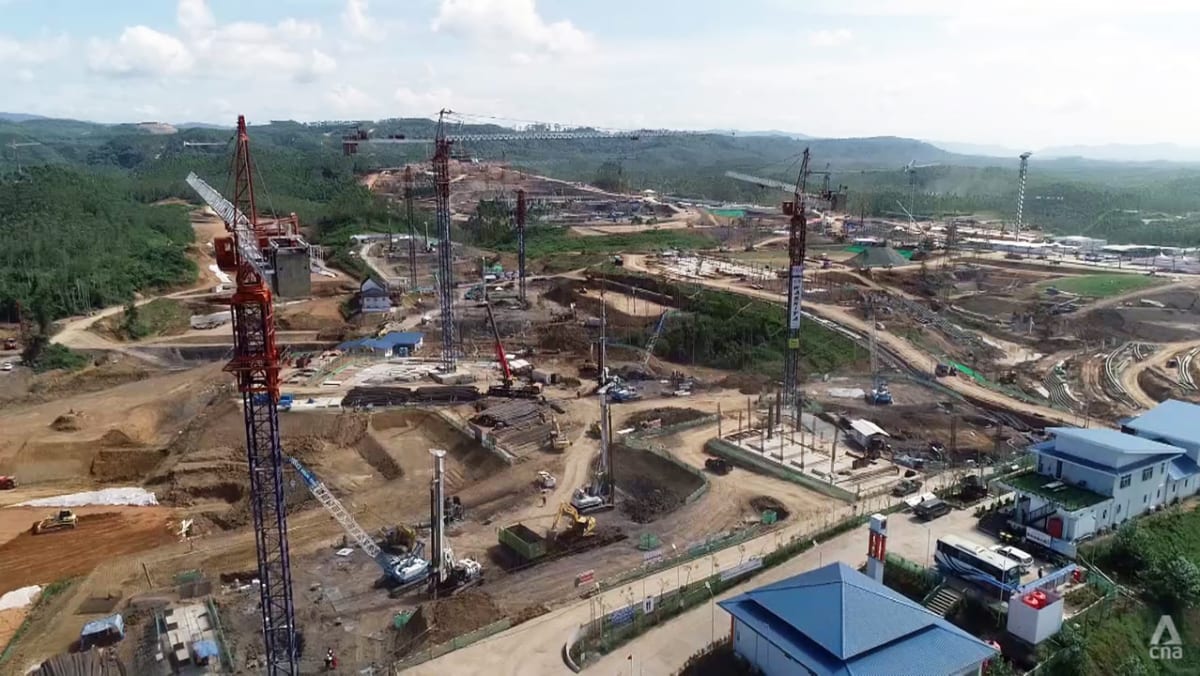EAST KALIMANTAN: As Indonesia’s future capital, Nusantara, gears up to welcome its first residents in less than a year’s time, some nearby villagers are praying they do not get left out in the cold or displaced without compensation.
In the village of Sepaku about 20 kilometres away, farmer Pandi had a rude surprise earlier this year when stakes appeared on his hectare of land. Attached to the stakes were yellow pieces of cloth with the words “development boundary”.
“One day, we found boundary markers next to our houses,” he said. “Of course, people who live here were shocked.”
Without anyone explaining what the markers meant, “we could only guess that this project will evict the settlement here”, said Pandi, referring to a dam being built across the Sepaku river, which will supply water to Nusantara.
“If (the authorities) want to continue the new capital city’s development, please go ahead,” Pandi told the programme Insight.
This is a sentiment echoed by some viewers on YouTube who support having the new capital in East Kalimantan and are looking forward to the government’s execution of the project as well as its potential.
But Pandi’s plea is this: “Please pay attention to us. Please give us clear (legal rights) over the land so that we can pass it on to our next generation.”
The first phase of Nusantara — comprising the palace, a few ministries’ premises and basic infrastructure such as roads and housing — is expected to be ready by Aug 17, Indonesia’s Independence Day, next year.
WATCH: Inside Indonesia’s move to new capital Nusantara — Will its people be ready? (46:19)
And equitable development is one of the issues facing the government as it races towards the launch date, with the authorities saying they are aware of the villagers’ concerns about compensation and lack of information and will address them.
The entire Nusantara project is scheduled for completion in 2045, when Indonesia celebrates 100 years of independence.
Billed as Indonesia’s first carbon-neutral city — 65 per cent of the area will be reforested — Nusantara aims to ease the load on the current capital, Jakarta, a metropolis of 10 million people that is crowded, polluted and sinking in parts.
Critics, however, have highlighted a host of issues, including the lack of consultation and the financial and environmental cost of building Nusantara.
The Balik people of Sepaku, who consist of nearly 200 families, have lived on their ancestral land “even before the Republic of Indonesia came into being”, he declared.
But since the 1970s, the area has seen an influx of migrants from other parts of Indonesia as part of the government’s transmigration programme, said Mareta Sari of JATAM (Mining Advocacy Network), a network of non-governmental organisations working on social justice and other issues relating to the mining, oil and gas industries.
“So if you ask how many tribes feel the destructive power of this nation’s capital, maybe the first people … will be the indigenous people,” she said.
Sibukdin acknowledged that Nusantara will need skilled workers — “graduates and postgraduates”. It would be “impossible” for people in his community to work as civil servants in the new capital as many “don’t even finish elementary school”.
What the government should do is equip the locals through training, he said.
Related stories:
Plan to hire foreigners to supervise construction of Indonesia’s new capital Nusantara draws criticism
As Indonesia prepares to move its capital to Kalimantan, some civil servants are reluctant to relocate
“We’ve been told we must be ready to receive our brothers and sisters from Java, Sulawesi, Sumatra and even abroad,” said Sibukdin. “Isn’t the government’s responsibility to make us ready first? That’s the right approach.
To this end, the authorities are “training, upskilling and reskilling” people in fields such as coding and renewable energy.
“I don’t want them … just watching (the transformation),” said Bambang, who is trained in engineering and infrastructure planning. “I want them to be part of (it).”
As for the social fabric, he felt that conflicts between locals and migrants were “very minimal” now, and he would like to maintain that state of harmony. Many of the migrants have been there for generations, he added.
Disparities must be addressed to avoid potential conflicts, observers noted.
Feelings of “injustice” in indigenous communities may later be reflected in hatred towards migrants, said Siwage Dharma Negara, a senior fellow and co-coordinator of the Indonesia Studies Programme at the ISEAS-Yusof Ishak Institute.
Ethnic tensions have boiled over before. Violence between the Madurese — originally from Madura Island off the coast of Java — and Dayaks in Central Kalimantan in 2001 resulted in hundreds of deaths.
Related articles:
No ‘fuss about each other’s religion’: Where lies Indonesia’s guard against extremism?
Commentary: Recent clashes at Chinese companies in Indonesia might be fodder for political manipulation
Unequal access to employment and economic opportunities was identified as one of the underlying causes.
The government must ensure indigenous groups are the “main actor” in Nusantara’s development and not merely involved in supporting activities, said Siwage. “Making sure that their livelihood, … their assets or their rights are protected is important.”
TARGETING INVESTMENTS
Meanwhile, work continues. The pressure is on Bambang’s team to have “some sort of ecosystem”, comprising the palace, offices, health care and educational institutions as well as shopping facilities, ready by next Aug 17. Development is on track, he said.
On its projected US$33 billion cost, Bambang reckoned “we’re going to go beyond that”.
President Joko Widodo has been pitching for investment worldwide. At a forum in Singapore in June, he assured investors their investments would be safe and there would be continuity in the project — even as Indonesians elect a new president next year.






